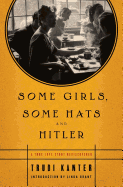
The path Trudi Kanter's memoir took to publication is almost as remarkable as the book itself. In 1984, Kanter self-published her tale of escaping the Nazis, but it soon went out of print. More than a quarter-century later, a British editor discovered a copy in a secondhand bookshop, and Some Girls, Some Hats and Hitler was rescued from oblivion.
Kanter (who died in 1992) wrote in the present tense, imparting a sense of optimism even though, as an Austrian Jew in 1938, she was effectively doomed. A talented, chic milliner, she created hats that were prized by fashionable Viennese women. Her passionate love for the dashing Walter Ehrlich kept her in Vienna after Hitler invaded, in part because he resisted acknowledging the danger. Kanter captures the fears of the time, but writes with equal detail of their love, her loyal customers and her hopes. Through her connections and cleverness in working diplomatic and legal angles, she and Ehrlich escaped to London in the summer of 1938, where the British briefly interned Walter (along with Kanter's father) and the family suffered through the Blitz. After the war, the couple became naturalized British citizens and prospered in their careers--Kanter eventually held a co-directorship of a hat company.
Some Girls, Some Hats and Hitler does not minimize the horrors of war or the Holocaust, but through Kanter's delightful hopefulness and spare, riveting writing, it presents an unusual memoir of an era that must not be forgotten. --Cheryl Krocker McKeon, bookseller

